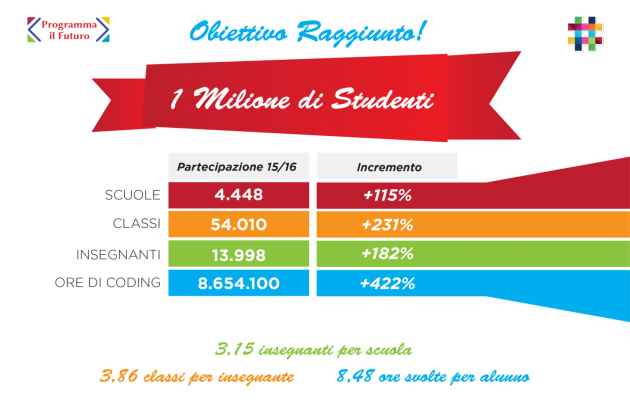Let me clarify right away that, although a degree in engineering, I studied the classic maintaining a deep love of Latin and Greek culture , which I consider the foundation of our civilization. I not therefore propose to replace the study of Latin with the computer, or to decrease the liberal arts education in our school. Far from it.
I start from the statement that the minister Stefania Giannini was released at the start of the second year of Program the Future : “ The coding is not an activity for iT , but a transversal competence that, like language skills, it is essential to acquire since the early years of the study. The coding is a new language, a computational language and learn it is a great way to enter the world on the right foot. The school must be a leader in the dissemination of these new experiences . “
I connect to these considerations some thoughts of a great French mathematician, Cédric Villani , recently winner of the Medal Fields, considered the Nobel prize for Mathematics, also a staunch supporter of the ‘ important to teach the’ computer science in schools . In some of his recent statements he compares the language of programming and other languages. Villani approaches the programming language to that of mathematics, such as “ languages that help man in his struggle for the understanding of the the world” and distinguishes them from languages such as English or German “ serving in the communication between people . “
then language speaks like Latin you learn through the rules (rather than through dialogue) to stress as their educational value lies “ in the mental discipline that you have to have, in the intellectual exercise that forces you to integrate the various sets of rules, combinations and configurations .” This exercise continues, it is beneficial for our neuronal circuits just like the one practiced in the study of mathematics or operation of the computational thinking . This term is what we use when we want to emphasize the cultural aspects of information technology , regardless of digital technology in which it manifests itself now everywhere around us. I have recently discussed a practical example.
Villani then points out an additional educational benefit that the computer: “ It’s pretty much the only discipline that allows students to correct yourself “. Unlike other languages, in which in the absence of a correction by the teacher is easy to persevere in error, a computer program that does not reach its goal immediately manifested its failure. Although this remark should not be considered in an absolute way (since – as happens in many other contexts – you can achieve the desired goal even with an incorrect method) the fact that, in the course of the learning process can be taught the concepts fundamentals of the computational thinking through educational activities that signal immediately if the student is progressing or not correctly, is extremely useful .
And, I might add is equally beneficial , in terms of student engagement, quest’apprendimento that can happen in a visible and constructive , moving a character on the screen or a robot on the classroom floor or – as happens in non-technological versions of our educational activities – driving a buddy to go through a maze. Just this immediate feedback capability is one of the reasons for the attraction of young people , which has led them to participate in large numbers to Codi-I love the competition, a competition based on computational thinking and how to exercise and train him.
Almost 800 schools and 1,200 teachers have worked, between March and April (months generally very demanding in schools), to send nearly 2,000 processed (with a mobilization then of about 40,000 students) in which they have carried stories, games and graphics, using computer programming. In the closing event during the second year of Program the Future , were awarded to the 34 winners of the resources made available by the partners of the initiative, and awarded numerous honorable mentions and about classes, schools and teachers who have distinguished themselves by quality and commitment.
the time to take stock of the participation in the project has also been: reached and surpassed one million students that the minister had called for the opening of the second year, every other number indicator signals a very flattering result, confirming the great interest of teachers and students to the cultural aspects of computer programming.

it is worth noting that these numbers correspond to almost 15% of the Italian school system . Taking up the terms introduced by Everett Rogers to describe the diffusion of innovations, it is interesting then to note that the spread of computational thinking in schools has actually almost passed both the stage of the innovators (the first few who venture to use the news) that one of the pioneers (the second wave of colonizing new lands). Whereas the commitment to the project is left to the free choice of schools, it means that the Our teachers are able to react positively to culturally interesting stimuli and that, perhaps, for our students the computer can be a discipline most beloved of Latin and mathematics to develop the rational cognition. Hopefully then, the next year, and managed to get to the involvement of the so-called early majority , to turn this innovation into a mass phenomenon that could contribute to a better future for Italy.
No comments:
Post a Comment